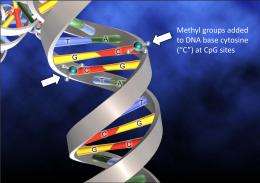Epigenetics of Lewy body disorders
Despite the success of modern genetics in identifying loci associated with common diseases, a substantial proportion of the causality remains unexplained. The epigenome of a cell is highly dynamic, governed by a complex interplay of genetic and environmental factors. Genetic marks are tagged by epigenetic information, such as DNA methylation and histone modification, and these epigenetic mechanisms are essential in regulating gene expression and maintaining genomic homeostasis.
Recent studies have found epigenetic changes associated with various complex human diseases, including neurodegenerative disorders as Alzheimer´s disease (de Jager, Nat Neurosci 2014). Very few epigenetic studies of Lewy body disorders (Parkinson's disease and Dementia with Lewy bodies) have so far been published, but initial results from our group indicates a role for methylation changes in disease risk (Pihlstrøm et al, Mov Disord 2015).
 No large-scale data are currently available to systematically assess the interplay between genetics and epigenetics in Lewy body disorders. The best studied epigenetic marks are changes in DNA methylation. The human genome is predominantly methylated on CpG sites by DNA methyltransferase. The DNA methylation ‘epigenetic clock’ is associated with chromatin remodeling and transcriptional regulation involved in neurodevelopment and environmental stress response. Our study will focus on the contribution of DNA methylation in susceptibility for Parkinson's disease and Dementia with Lewy bodies. Methylation is challenging to study because it varies across and even within tissues. Thus, we will primarily analyze methylation status in the tissue involved in the disease process; the brains.
No large-scale data are currently available to systematically assess the interplay between genetics and epigenetics in Lewy body disorders. The best studied epigenetic marks are changes in DNA methylation. The human genome is predominantly methylated on CpG sites by DNA methyltransferase. The DNA methylation ‘epigenetic clock’ is associated with chromatin remodeling and transcriptional regulation involved in neurodevelopment and environmental stress response. Our study will focus on the contribution of DNA methylation in susceptibility for Parkinson's disease and Dementia with Lewy bodies. Methylation is challenging to study because it varies across and even within tissues. Thus, we will primarily analyze methylation status in the tissue involved in the disease process; the brains.
In this project, we aim to identify epigenetic risk factors central to the pathogenesis of Lewy body disorders. We hypothesize that pathophysiological changes in DNA methylation significantly affect gene regulation eventually resulting in neurodegeneration. We use a combination of modern techniques; including whole genome methylation profiling of brain tisuues, targeted deep sequencing and studies of methylation in blood samples to nominate biomarkers.
Responsible: Postdoc Lasse Pihlstrøm, MD, PhD
Funding: Nasjonalforeningen, Research Council of Norway
